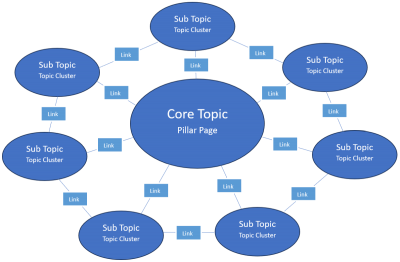TOPIC CLUSTERS AND HOW THEY BENEFIT SEO

Topic Clusters have proven to be an effective strategy time and time again in providing helpful content and in benefiting your website's SEO.
In this article we will take a look at what they are, their structure and benefits, and how they can improve your SEO performance.
What Are Topic Clusters
Topic clusters are a content marketing and SEO strategy that involves organising and linking related pieces of content (blog posts, articles, etc.) together to create a comprehensive resource on a specific topic. Instead of creating individual, isolated articles on various topics, topic clusters focus on a central pillar page that covers a broad topic in-depth. This pillar page acts as the core hub for the cluster. The topic cluster strategy typically includes the following elements:
1. Pillar page
The pillar page is a long-form, comprehensive piece of content that covers a broad topic. It serves as the central hub and provides a detailed overview of the topic.
2. Cluster content
Cluster content consists of individual blog posts or articles that delve into subtopics related to the main pillar page. Each piece of cluster content is hyperlinked to the pillar page and other relevant cluster content.
3. Hyperlinks
The pillar page links out to the cluster content, and the cluster content links back to the pillar page. This interlinking signals to search engines the relationships between the content pieces, establishing authority and expertise on the topic.
4. Keyword strategy
Each cluster content piece focuses on specific long-tail keywords related to the overall topic. This strategy helps improve the chances of ranking for a wide range of related search queries.
It's essential to keep the content up to date, expand on new developments, and create new cluster content over time to maintain the relevancy and effectiveness of the topic cluster strategy.
How Do Topic Clusters Benefit SEO?
By interlinking and establishing relationships between content pieces, search engines are more likely to recognize the pillar page as a valuable resource on the topic, potentially boosting its search engine ranking. This approach offers several benefits for search engine optimisation (SEO) and content marketing efforts. Let's explore some of these benefits:
1. Improved search engine rankings
By creating a comprehensive cluster of content around a central pillar page, you increase your chances of ranking higher in search engine results for related search queries. Search engines, like Google, appreciate well-organised content that covers a topic in-depth and rewards such clusters with improved visibility in search results.
2. Enhanced user experience
Topic clusters help provide a better user experience for website visitors. Users can easily navigate through different subtopics linked to the main pillar page, finding relevant information and exploring related content. This improved user experience can lead to higher engagement metrics and longer session durations, both of which are positive signals for search engines.
3. More organic traffic
As your topic cluster gains visibility in search engine results, it is likely to attract more organic traffic to your website. People searching for various aspects of the main topic are more likely to discover your content and explore other related pages, increasing the overall traffic to your site.
4. Higher click-through rates (CTR)
When a topic cluster occupies a significant portion of the search results with multiple links, it tends to attract more clicks from users looking for comprehensive information. Higher CTRs can signal to search engines that your content is valuable and relevant, potentially leading to further ranking improvements.
5. Authority and expertise
Building a well-structured topic cluster demonstrates your website's authority and expertise on the subject. As you consistently publish high-quality content on the core topic and its related subtopics, you establish your site as a reliable resource in the eyes of both users and search engines.
6. Internal linking and page authority
Internal links play a crucial role in SEO, helping search engines understand the structure of your website and the relationships between pages. Topic clusters rely heavily on internal linking, which spreads page authority (link juice) throughout the cluster. As a result, the pillar page's authority can boost the rankings of the cluster pages and vice versa.
7. Long-term content strategy
Topic clusters provide a foundation for a sustainable and long-term content strategy. As your industry or niche evolves, you can easily expand and update the cluster with new subtopics or revisions to the existing content, keeping it fresh and relevant for users and search engines.
8. Voice search and featured snippets
With the rise of voice search and featured snippets, topic clusters have even more significance. Well-organised clusters that cover the different aspects of a topic may have a higher chance of being featured as a rich snippet in voice search results.
In conclusion the main advantages of using topic clusters are improved SEO performance, increased organic traffic, and a better user experience. When visitors find relevant, comprehensive information on a specific topic in one place, they are more likely to stay on the site, engage with the content, and become repeat visitors.

